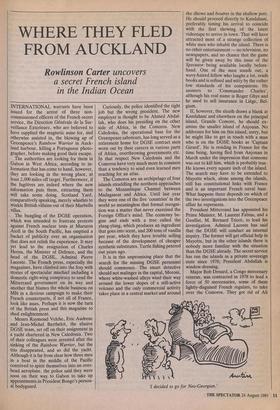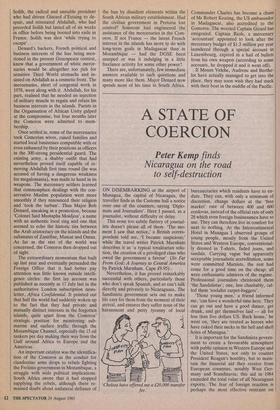WHERE THEY FLED FROM AUCKLAND
Rawlinson Carter uncovers
a secret French island in the Indian Ocean
INTERNATIONAL warrants have been issued for the arrest of three non- commissioned officers of the French secret service, the Direction Generale de la Sur- veillance Exterieure, who are believed to have supplied the magnetic mine for, and otherwise assisted in, the blowing up of Greenpeace's Rainbow Warrior in Auck- land harbour, killing a Portuguese photo- grapher, before making good their escape.
The authorities are looking for them in Gabon in West Africa; according to in- formation that has come to hand, however, they are looking in the wrong place, at least 2,000 miles off target. Furthermore, if the fugitives are indeed where the new information puts them, extracting them will take some doing. Scotland Yard, comparatively speaking, merely whistles to winkle British villains out of their Marbella villas.
The bungling of the DGSE operation, which was intended to frustrate protests against French nuclear tests at Mururoa Atoll in the South Pacific, has emptied a bucket of publicity over an organisation that does not relish the experience. It may yet lead to the resignation of Charles Hernu, the Minister of Defence, and the head of the DGSE, Admiral Pierre Lacoste. The French press, especially the magazines, have climbed into the fray with stories of spectacular mischief including a domestic right-wing conspiracy to send the Mitterrand government on its way and another that blames the whole business on MI6 in a devious campaign to make their French counterparts, if not all of France, look like asses. Perhaps it is now the turn of the British press and this magazine to shed enlightenment.
Messrs Raymond Velche, Eric Audrenc and Jean-Michel Berthelot, the elusive DOSE team, set off on their assignment in a yacht chartered in New Caledonia. Two of their colleagues were arrested after the sinking of the Rainbow Warrior, but the trio disappeared, and so did the yacht. Although it is far from clear how three men in a boat in the middle of the Pacific contrived to spirit themselves into an over- head aeroplane, the police said they were soon on their way to Gabon to take up appointments in President Bongo's person- al bodyguard. Curiously, the police identified the right job but the wrong president. The new employer is thought to be Ahmed Abdal- lah, who does his presiding on the other side of Africa, in the Comoros. New Caledonia, the operational base for the Greenpeace saboteurs, has long served as a retirement home for DGSE contract men worn out by their careers in various parts of Africa, overthrowing governments etc. In that respect New Caledonia and the Comoros have very much more in common than a tendency to send even learned men reaching for an atlas. The Comoros are an archipelago of four islands straddling the northern approaches to the Mozambique Channel between Madagascar and Africa. Until last year they were one of the five 'countries' in the world so meaningless that formal recogni- tion was a matter that never exercised the Foreign Office's mind. The economy be- gins and ends with a tree called the ylang-ylang, which produces an ingredient that goes into scent, and 200 tons of vanilla per year, which they have trouble selling because of the development of cheaper synthetic substitutes. Turtle fishing petered out years ago. It is in this unpromising place that the search for the missing DOSE personnel should commence, The smart detective should not malinger in the capital, Moroni, where white-washed alleys wind their way around the lower slopes of a still-active volcano and the only commercial activity takes place in a central market and around the dhows and boutres in the shallow port. He should proceed directly to Kandahani, preferably timing his arrival to coincide with the first showing of the latest videotape to arrive in town. That will have attracted most of _a strange collection of white men who inhabit the island. There is no other entertainment — no television, no newspapers, and no chance that the game will be given away by this issue of the Spectator being available locally before- hand. One of the men stands out, a wavy-haired fellow who laughs a lot, reads books and is refined and witty by the rather low standards of his companions. He answers to 'Commander Charles', although his real name is Roger Ghys and he used to sell insurance in Liege, Bel- gium.
If, however, the sleuth draws a blank at Kandahani and elsewhere on the principal island, Grande Comore, he should ex- amine the smaller island of Anjouan. No addresses for him on this island, sorry, but he might like to get in touch with a man who is on the DOSE books as 'Captain Girard'. He is residing in France for the time being, having fled from Anjouan in March under the impression that someone was out to kill him, which is probably true. He knows every square inch of the island. The search may have to be extended to Mayotte which, alone among the islands, still has constitutional links with France and is an important French naval base. What happens there depends on which of the two investigations into the Greenpeace affair he represents.
President Mitterrand has appointed his Prime Minister, M. Laurent Fabius, and a Gaullist, M. Bernard Tricot, to lead his investigation. Admiral Lacoste has said that the DGSE will conduct an internal inquiry. The former will get official help in Mayotte, but in the other islands there is nobody more familiar with the situation than the DGSE already. The secret service has run the islands as a private sovereign state since 1978; President Abdallah is window-dressing.
Major Bob Denard, a Congo mercenary veteran, was contracted in 1978 to lead a force of 50 mercenaries, some of them lightly-disguised French regulars, to take over the Comoros. They got rid of Ali 'I decided to go for Neo-Georgian.' Soilih, the radical and unstable president who had driven Giscard d'Estaing to de- spair, and reinstated Abdallah, who had preceded Soilih but lasted all of six weeks in office before being booted into exile in France. Soilih was shot 'while trying to escape'.
Denard's backers, French political and business interests of the hue being men- tioned in the present Greenpeace context, knew that a government of white merce- naries would be altogether too rich for sensitive Third World stomachs and in- sisted on Abdallah as a cosmetic front. The mercenaries, short of congenial work in 1978, went along with it. Abdallah, for his part, realised that he needed an injection of military muscle to regain and retain his business interests in the islands. Purists in the Organisation of African Unity gulped at the compromise, but four months later the Comoros were admitted to mem- bership.
Once settled in, some of the mercenaries took Comcnian wives, raised families and started local businesses compatible with or even enhanced by their positions as officers in the 300-strong presidential guard. The existing army, a shabby outfit that had nevertheless proved itself capable of re- moving Abdallah first time round (he was accused of having a dangerous weakness for megalomania), was made to hand in its weapons. The mercenary settlers learned that commonplace dealings with the con- servative Muslim population went more smoothly if they renounced their religion and 'took the turban'. Thus Major Bob Denard, sneaking in a promotion, became 'Colonel Said Mustapha Moidjou', a name with an authentic local ring and one that seemed to echo the historic ties between the Arab aristocracy on the islands and the sultanates of Zanzibar, Muscat and Oman. As far as the rest of the world was concerned, the Comoros then dropped out of sight.
The extraordinary momentum that built up last year and eventually persuaded the Foreign Office that it had better pay attention was little known outside intelli- gence circles: the first lay account was published as recently as 17 July last in the authoritative London subscription news- letter, Africa Confidential. It pointed out that half the world had suddenly woken up to the fact that they had private and mutually distinct interests in the forgotten islands, quite apart from the Comoros' strategic position for monitoring sub- marine and surface traffic through the Mozambique Channel, especially the 15 oil tankers per day making their way from the Gulf around Africa to Europe and the Americas.
An important catalyst was the identifica- tion of the Comoros as the conduit for clandestine arms drops to rebels fighting the Frelimo government in Mozambique, a struggle with wide political implications. South Africa swore that it had stopped supplying the rebels, although there re- mained doubt about unilateral defiance of the ban by dissident elements within the South African military establishment. Had the civilian government in Pretoria lost control? Someone had engineered the assistance of the mercenaries in the Com- oros. If not France — the latent French interest in the islands has more to do with long-term goals in Madagascar than in Mozambique — had the DGSE been usurped or was it indulging in a little freelance activity for some other power?
There are, unfortunately, few immediate answers available to such questions and many more like them. Major Denard now spends most of his time in South Africa. Commander Charles has become a chum of Mr Robert Keating, the US ambassador in Madagascar, also accredited to the Comoros. The worried Captain Girard has emigrated. Captain Riols, a mercenary 'accountant' appointed to look after the mercenary budget of $1.3 million per year laundered through a special account in Luxembourg, expired in a hail of bullets from his own ,weapon (according to some accounts, he dropped it and it went off).
If Messrs Velche, Audrenc and Berthe- lot have actually managed to get into the place, they may soon wish they had stuck with their boat in the middle of the Pacific.











































 Previous page
Previous page